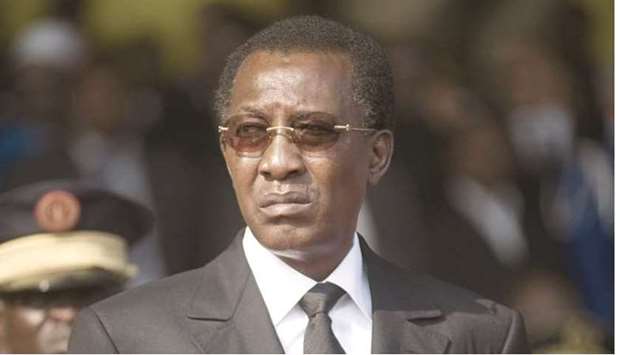Chad’s President Idriss Deby Itno died in combat after three decades in power, the army said yesterday, opening a period of uncertainty in a country that is a key strategic ally of the West in a troubled region.
His son was immediately named transitional leader as head of a military council and both the government and parliament were dissolved, but the army vowed “free and democratic” elections after an 18-month transitional period.
The army said Deby had died from injuries sustained as he led his troops against rebels who launched an offensive against his regime from Libya last week.
Chad had claimed victory against the fighters, but soon after the announcement of Deby’s death, they vowed to pursue their offensive and march on the capital N’Djamena.
The shock news came just a day after the 68-year-old career military man was proclaimed the winner of a presidential election that gave him a sixth term in office.
The army also announced a curfew and border closures, while a state funeral was planned for Friday.
Deby, often called “marshal” due to his military rank, had ruled Chad since taking power on the back of a coup in 1990, and often put members of his family and ethnic group in key positions in government and the military.
He was nonetheless a key ally in the West’s anti-militant campaign in the unstable Sahel region, particularly due to the relative strength of Chad’s military and its ability to supply weaponry and soldiers.
Former colonial power France hailed Deby as an “essential ally in the fight against terrorism” and called for a peaceful transition over a limited timeframe. Following the announcement of Deby’s death, presidential guard officers in civilian clothes roamed N’Djamena with walkie-talkies and handguns.
Police in black uniforms and masks were also on the streets, although the military presence was no more intensive than since the rebel offensive began in northern Chad on April 11, the day of the presidential election.
The army said Deby had been commanding his forces at the weekend as they battled rebel Front for Change and Concord in Chad (FACT). Deby “has just breathed his last breath defending the sovereign nation on the battlefield,” army spokesman General Azem Bermandoa Agouna said in a statement read out on state television.
He said Deby had died yesterday, but the presidency later gave the date as Monday.
The army said a military council led by the late president’s 37-year-old son Mahamat Idriss Deby Itno, a four-star general, would replace him.
Deby’s son oversaw his father’s security as head of the elite presidential guard and often appeared alongside him, wearing the force’s red beret, dark glasses and military fatigues.
On Monday, the army claimed a “great victory” against FACT, saying it had killed more than 300 rebels and captured 150 more, with the loss of five soldiers. But FACT spokesman Kingabe Ogouzeimi de Tapol said that the rebels would continue the offensive after a short delay for Deby’s funeral.
“We categorically reject the transition,” he said.
The rebels had earlier claimed that Deby had been wounded — a report that could not be confirmed.
Ministers and high-ranking military brass had said Monday that Deby was in the region on Saturday and Sunday after the rebel offensive.
Deby was among the world’s longest-serving leaders and had on previous occasions gone to the frontlines as government forces battled rebels.
Provisional results released Monday showed him winning re-election with almost 80% of the vote against nine challengers. His victory had never been in doubt, with a divided opposition, boycott calls, and a campaign in which demonstrations were banned or dispersed.
Deby was a herder’s son from the Zaghawa ethnic group who took the classic path to power through the army.
He had campaigned for the latest election on a promise of bringing peace and security to the troubled region, but his pledges were undermined by the rebel incursion.The government had sought Monday to assure concerned residents that the offensive in the provinces of Tibesti and Kanem was over.
Panic had been triggered in some areas of N’Djamena on Monday after tanks were seen on main roads, an AFP journalist reported.
They were later withdrawn apart from a perimeter around the president’s office. Much remains unclear regarding the rebel action, which had led several nations including the United States and Britain to advise their nationals to leave.

Idriss Deby
